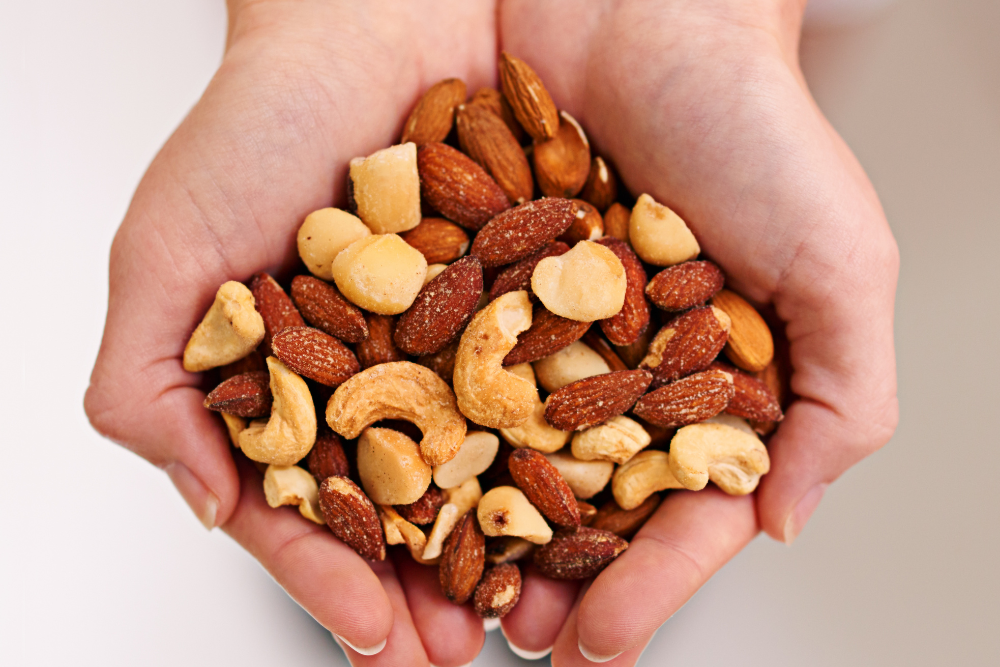
If you’re searching for brands of gluten-free nuts, I’ve got you covered in this post. I share what the major brands of peanuts and tree nuts say about gluten and which brands are safe to consume when following a gluten-free diet. I also tested several nut brands for hidden gluten and reveal the results in this article. This post contains affiliate links. Please see my disclosures.
While peanuts and tree nuts are naturally gluten-free, many nut brands cannot guarantee their products are free from gluten, a protein found in wheat, rye, barley, and sometimes oats.
Gluten is off-limits to people with celiac disease, gluten intolerance, and non-celiac gluten sensitivity.
Unfortunately, many nuts are not labeled gluten-free, leaving gluten-free consumers to wonder if their favorite brand of peanuts or tree nuts contains gluten.
While nuts are naturally gluten-free, some contain coatings that may not be gluten-free, or they may be processed and packaged on shared manufacturing equipment also used to process and package foods containing gluten, such as pretzels and crackers.
While researching what the most popular nut brands say about gluten, I was discouraged to find out that many of them are NOT SAFE to consume on a gluten-free diet.
For the nut brands that looked safe, I independently tested them for hidden gluten using my Nima Sensor, a portable gluten-detecting device. You can learn more about Nima in my article, What You Need to Know About Nima Sensor Before You Buy – Perspective from a Celiac & Nutrition Professional.
(1) Blue Diamond
Blue Diamond says that most of its products do not contain wheat or other gluten grains EXCEPT for its Jordan almonds, Wasabi & Soy Sauce almonds, and Sweet Thai Chili-flavored almonds.
Please note that Blue Diamond also manufactures Almond Breeze dairy-free milk alternative, which it says is gluten-free. The company also makes Nut-Thins crackers, which it says are tested and certified gluten-free by the GFCO.
I independently tested Blue Diamond almonds with my Nima Sensor, and Nima displayed a smiley face, which means it did not find any gluten.
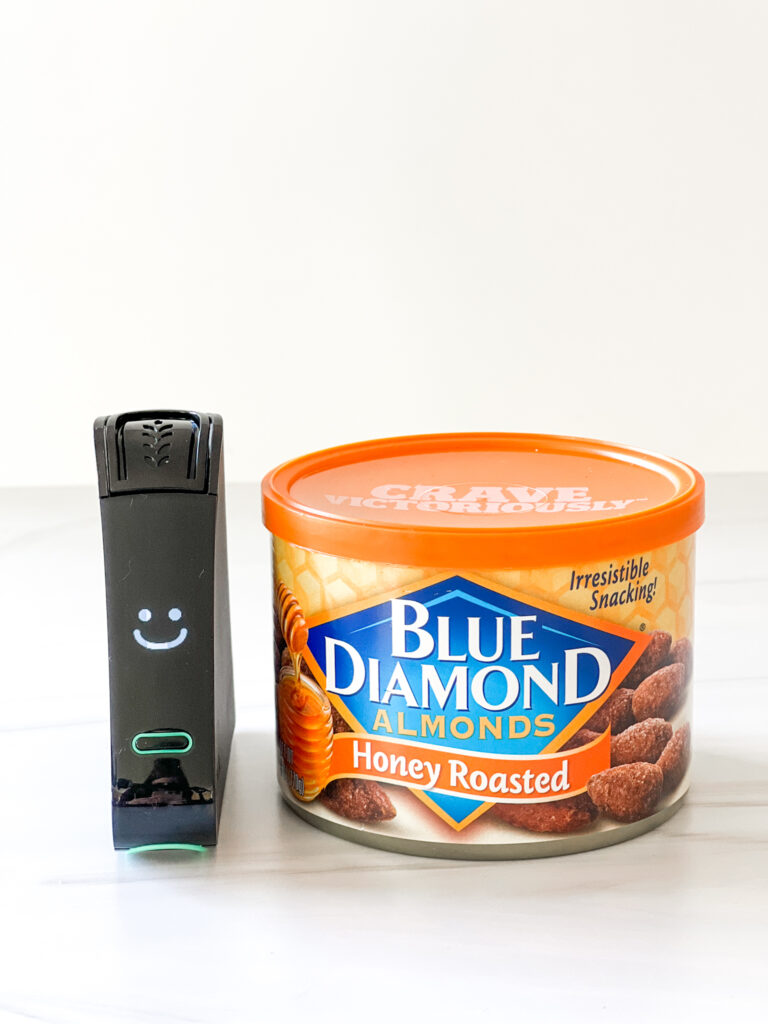
(2) Emerald – IMPORTANT UPDATE
UPDATED March 2024: A reader (thanks D’Arcy) noticed that Flagstone Foods recently purchased Emerald and that the nuts were no longer certified gluten-free by the GFCO. (I searched the GFCO Product Directory and confirmed that Emerald is no longer on the certified GF list.)
She contacted the company, and a spokesperson told her, “Many of our products are formulated without any type of wheat, rye, barley, or crossbreeds of these grains and could be considered free of these gluten-containing ingredients. However, due to the agricultural nature of our supply chain and FDA testing requirements to make finished product claims, we do not make any gluten-free claims or certifications.”
It’s likely the nuts are still gluten-free, but the company no longer works with the GFCO to certify this claim. Therefore, I recommend consuming them at your own risk. They may – or may not be – gluten-free.
This is also a good reminder that the latest information about a product will always be on the label itself. Read those labels carefully, as they can change at any time.
(3) Fisher
According to the Fisher website, some nuts contain gluten and/or are produced and packaged in a shared facility.
The company employs “separation, segregation, and sanitation measures.” It also recommends that consumers on a gluten-free diet should only purchase Fisher products labeled “gluten-free,” which, according to the company, have been routinely tested to ensure they do not contain traces of gluten.
For example, the walnut halves & pieces shown below are labeled “gluten-free,” which means the company has verified the product as safe for the gluten-free community.
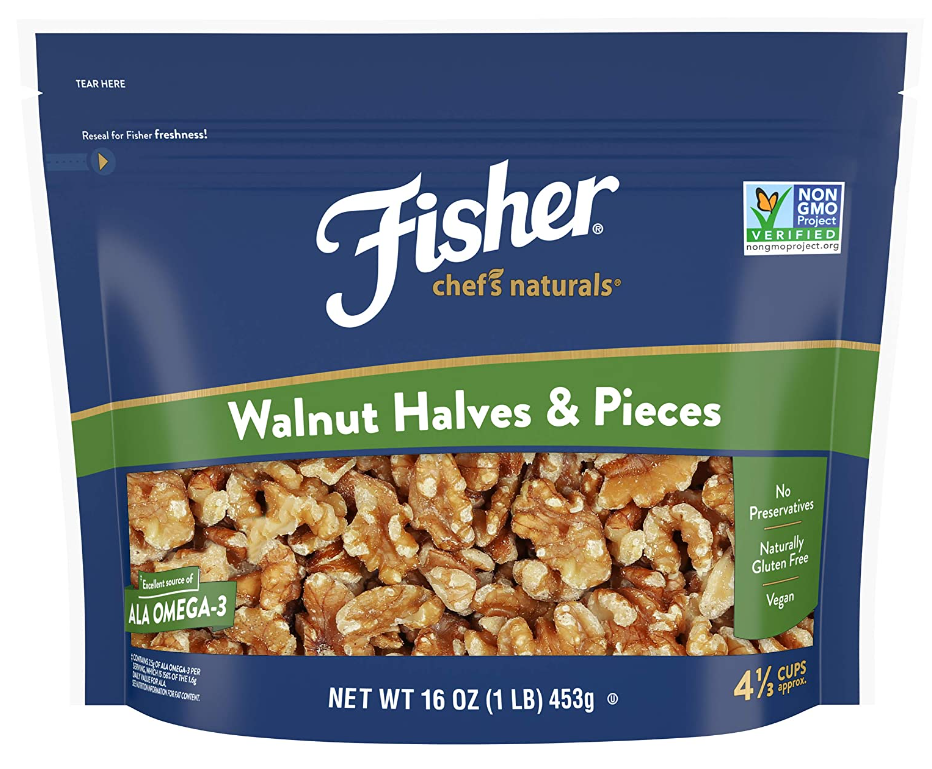
Please note, however, that Fisher’s glazed pecans are not labeled “gluten-free.” While they do not have gluten-containing ingredients, the company says it does not guarantee the same oversight that goes into the products labeled “gluten-free.”
The bottom line: When buying Fisher nuts, only buy products marked “gluten-free” or “naturally gluten-free.”
(4) Kirkland (Costco)
Many Kirkland nuts, unfortunately, are not safe for the gluten-free community. Why? Most of them show an allergen warning statement that says: “Processed on equipment that also packages products that may contain peanuts, other tree nuts, wheat, soy, milk, and eggs.”
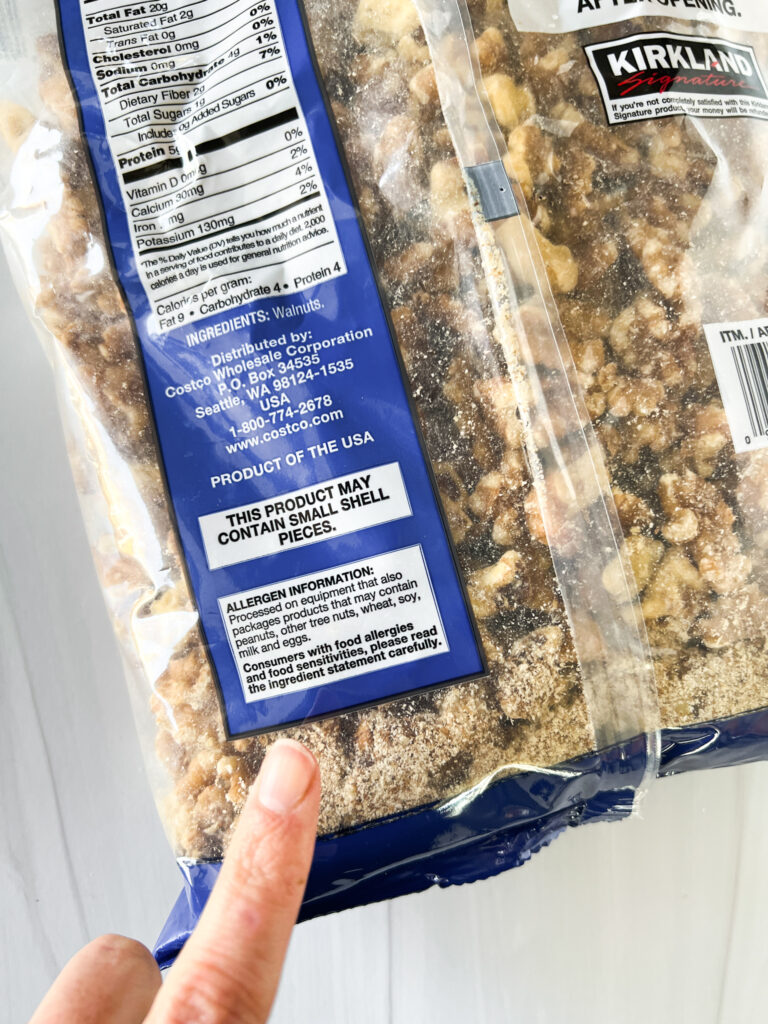
While I typically avoid products with such disclaimers, I still wanted to test Kirkland walnuts for hidden gluten to see what Nima had to say. As you can see, Nima was all smiles, which means it didn’t find any gluten.
That said, buyer beware. Nima only checked one tiny piece of walnut. Buyer beware.
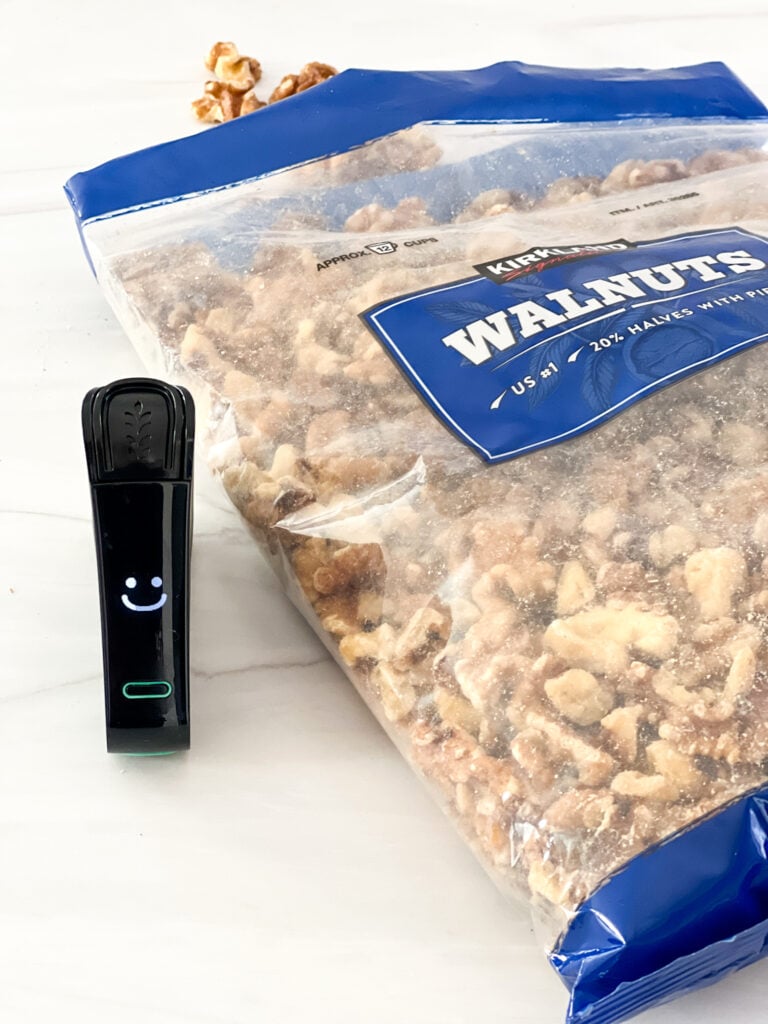
(5) Nuts.com – BEST VALUE
Nuts.com is a gluten-free haven, as most of its nuts are labeled gluten-free or certified gluten-free by the Gluten-Free Food Program (GFFP). The GFFP is an organization endorsed by the National Celiac Association. The certification guarantees that the products contain less than five parts per million (ppm) of gluten.
Please note that Nuts.com recently switched (in 2022) to the GFFP program, but since the shift, some packages still contain the GFCO’s logo, as pictured below.
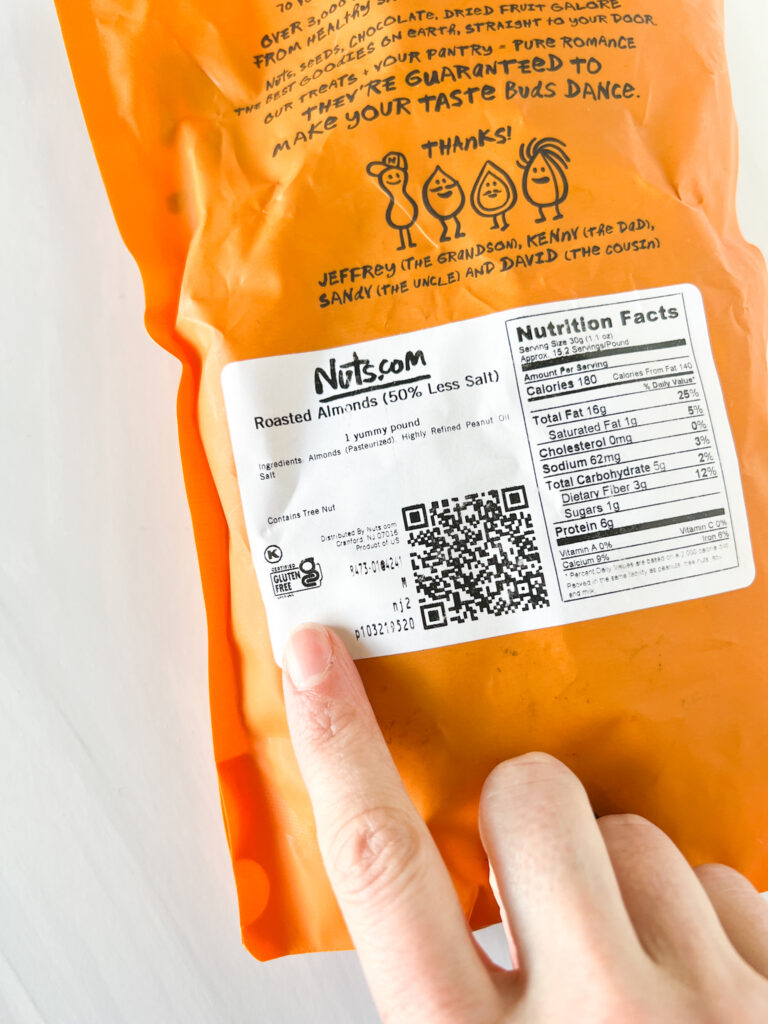
The company further says that while some gluten-free products aren’t GFFP-certified, Nuts.com still adheres to gluten-free guidelines set by the Food & Drug Administration (FDA). This means Nuts.com guarantees its “gluten-free” labeled products contain less than 20 parts per million (ppm) of gluten.
The company also says it maintains a separate gluten-free production line in its warehouse to ensure the purity of its gluten-free products.
I independently tested several Nuts.com varieties with my Nima Sensor, and Nima displayed a smile, which means it didn’t find any hidden gluten.
Get $5 off Nut.com when you activate this coupon code.
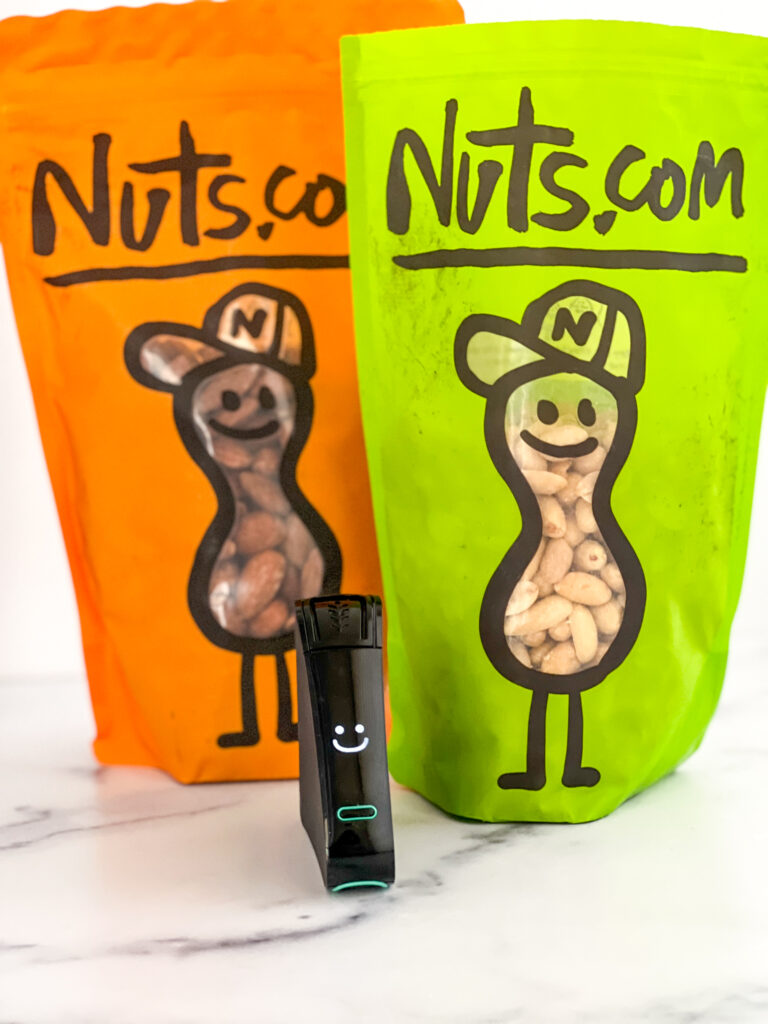
(6) Planters
Unfortunately, Planters nuts are not labeled gluten-free; however, the only ingredients in most Planters’ nut varieties are nuts (i.e., cashew, almond, peanut), sea salt, and peanut oil. The ingredient label contains no “may contain” or other allergen disclosure statements about shared equipment or manufacturing facilities.
Hormel manufactures Planters peanuts, and according to Hormel, some Planters products are formulated without gluten-containing ingredients, including:
- Planters Mixes (Heart Healthy, Men’s Heath, Omega-3)
- Planters Nutrition Mixes (Antioxidant, Energy, Essential Nutrients, Fiber, Heart Healthy, Men’s Health, Omega-3, Vitality Blend, Wholesome Nut)
However, on its website, Hormel says nothing about Planters salted and plain nuts. I emailed the company, and a representative told me the following: “If any of these gluten components are in any product, it will be declared in the ingredient listing.”
I also independently tested Planters salted cashews for hidden gluten with my Nima Sensor, and Nima smiled, which means it didn’t find any gluten.
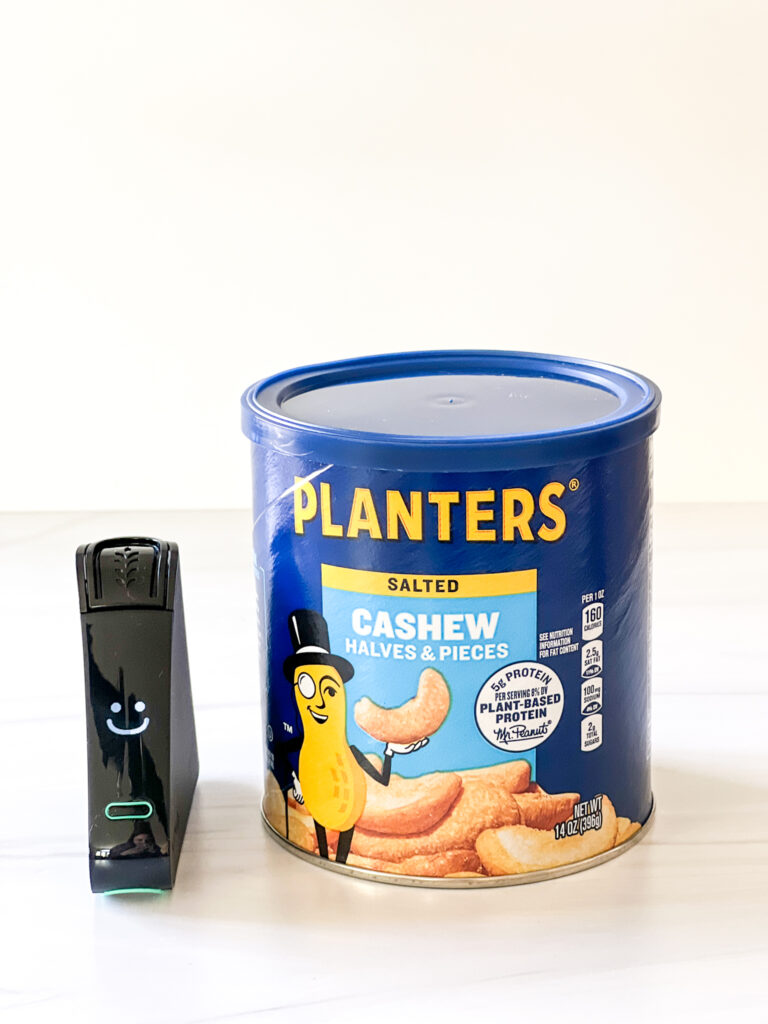
(7) Trader Joe’s
Trader Joe’s says if a product is labeled “gluten-free,” the grocer has independently confirmed that the product contains less than 20 ppm of gluten per the FDA gluten-free labeling guidelines.
While most of the nuts at Trader Joe’s are not labeled gluten-free, they don’t contain gluten nor bear any “may contain” or allergen disclosure statements.
While I cannot say if Trader Joe’s nuts are free from gluten, I can tell you that I’ve tested several for hidden gluten with my Nima. Nima smiled every time, meaning the device found no hidden gluten.
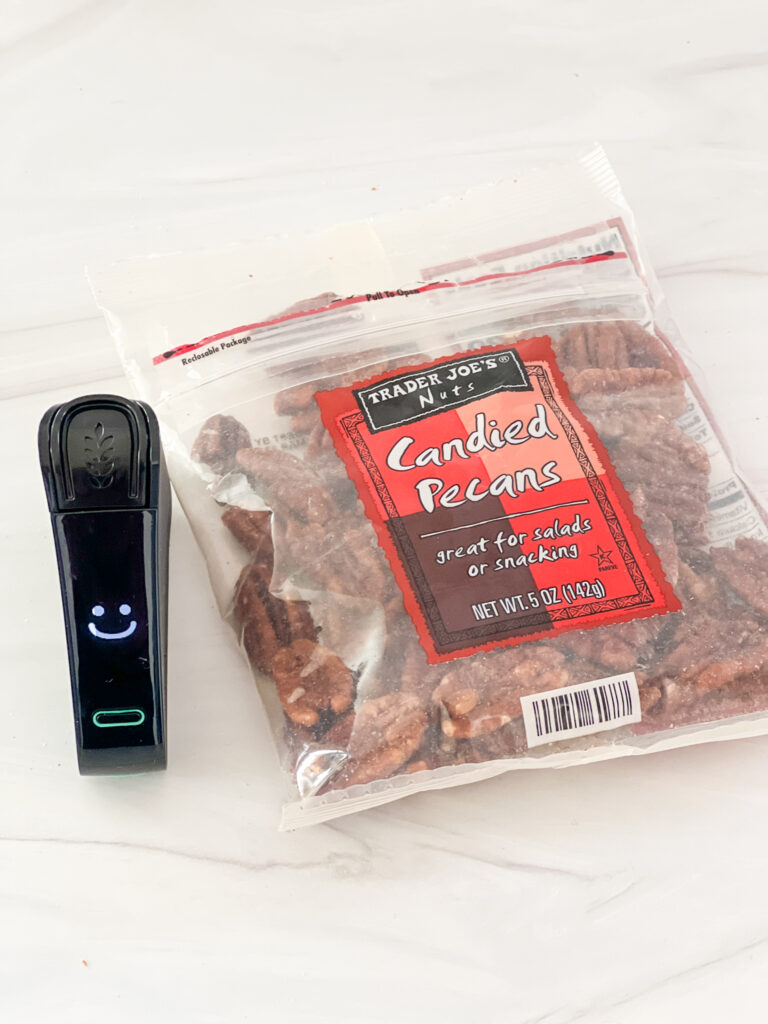
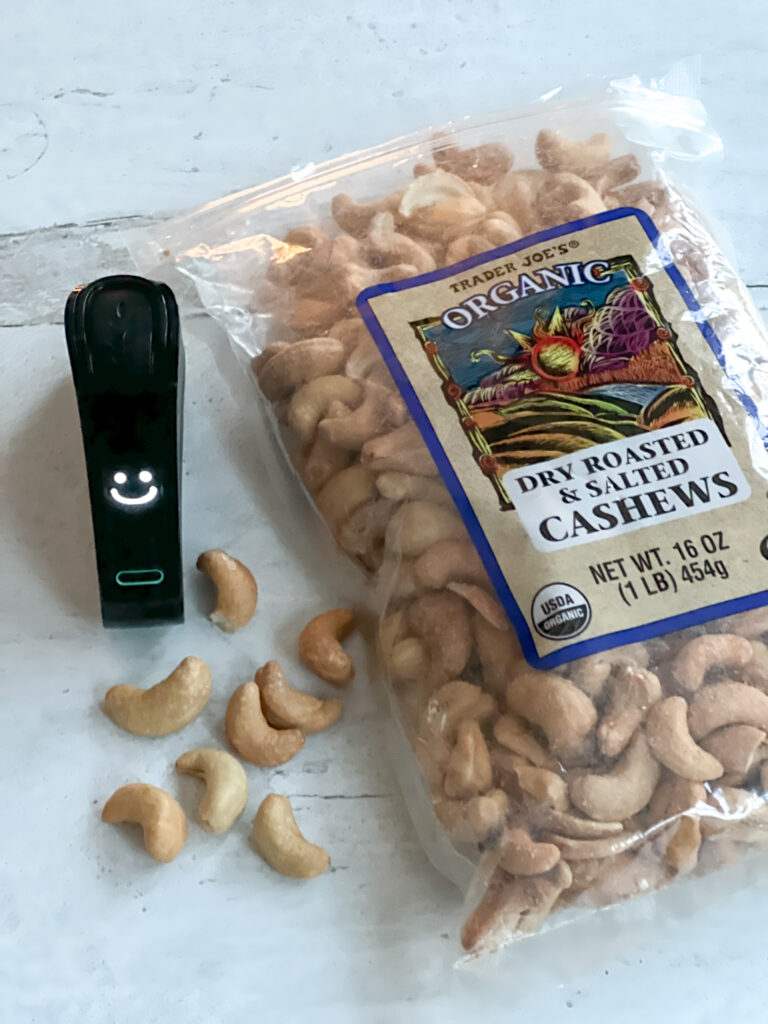
(8) Wonderful Pistachios
Pistachios are naturally gluten-free and make for an excellent naturally gluten-free snack. The aptly named Wonderful Pistachios are wonderful, and they’re labeled gluten-free.
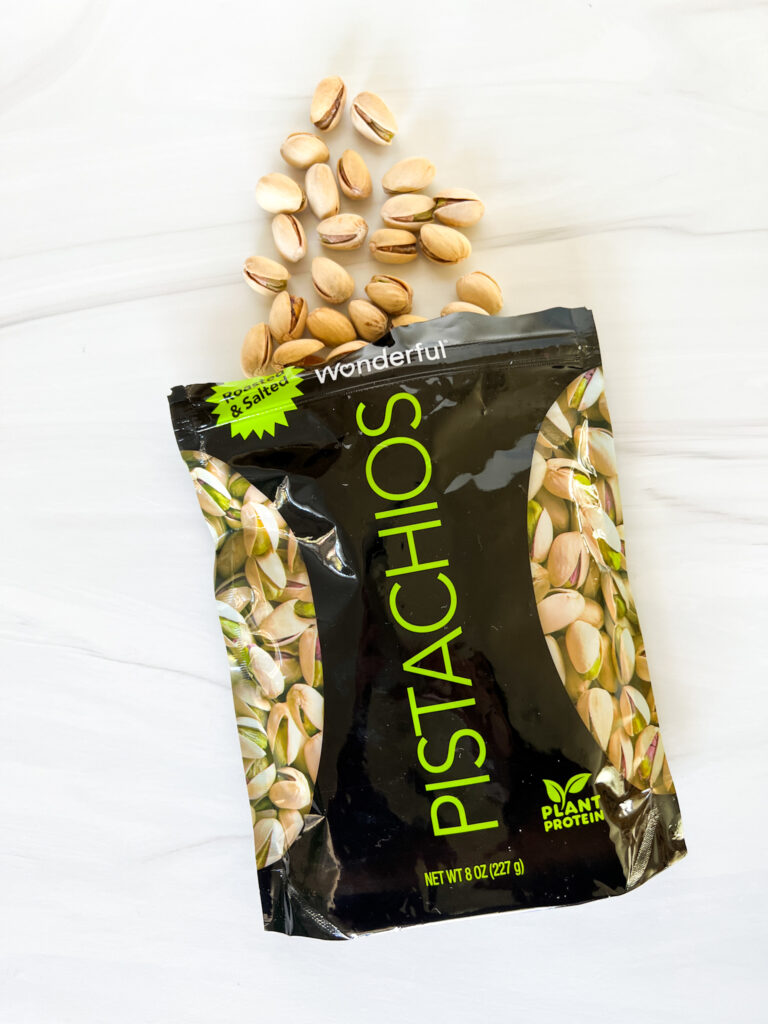
According to the Wonderful website, even its flavored pistachios do not contain any gluten, nor do any of their pistachios come in contact with gluten during the manufacturing process.
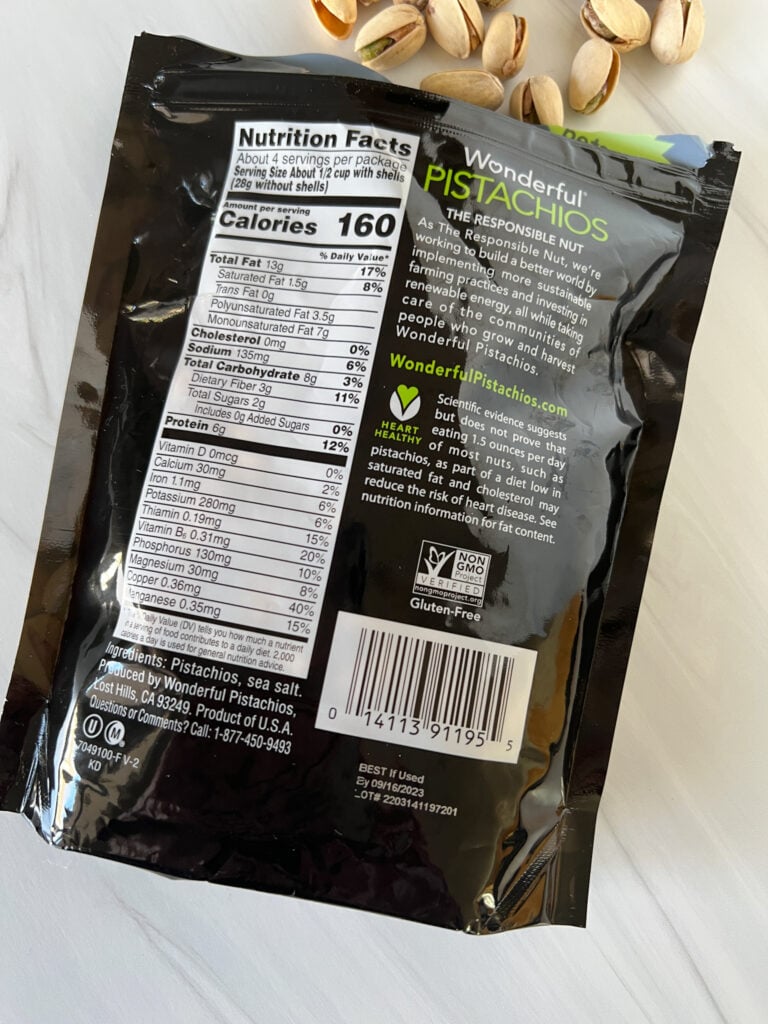
(9) Sahale Snacks
Sahale Snacks makes a variety of flavored nut snack packs. All Salhale products are certified gluten-free by the GFCO; check labels to ensure the product is safe, as ingredients and formulations can change. (Photo by Sahale Snacks via Facebook.)
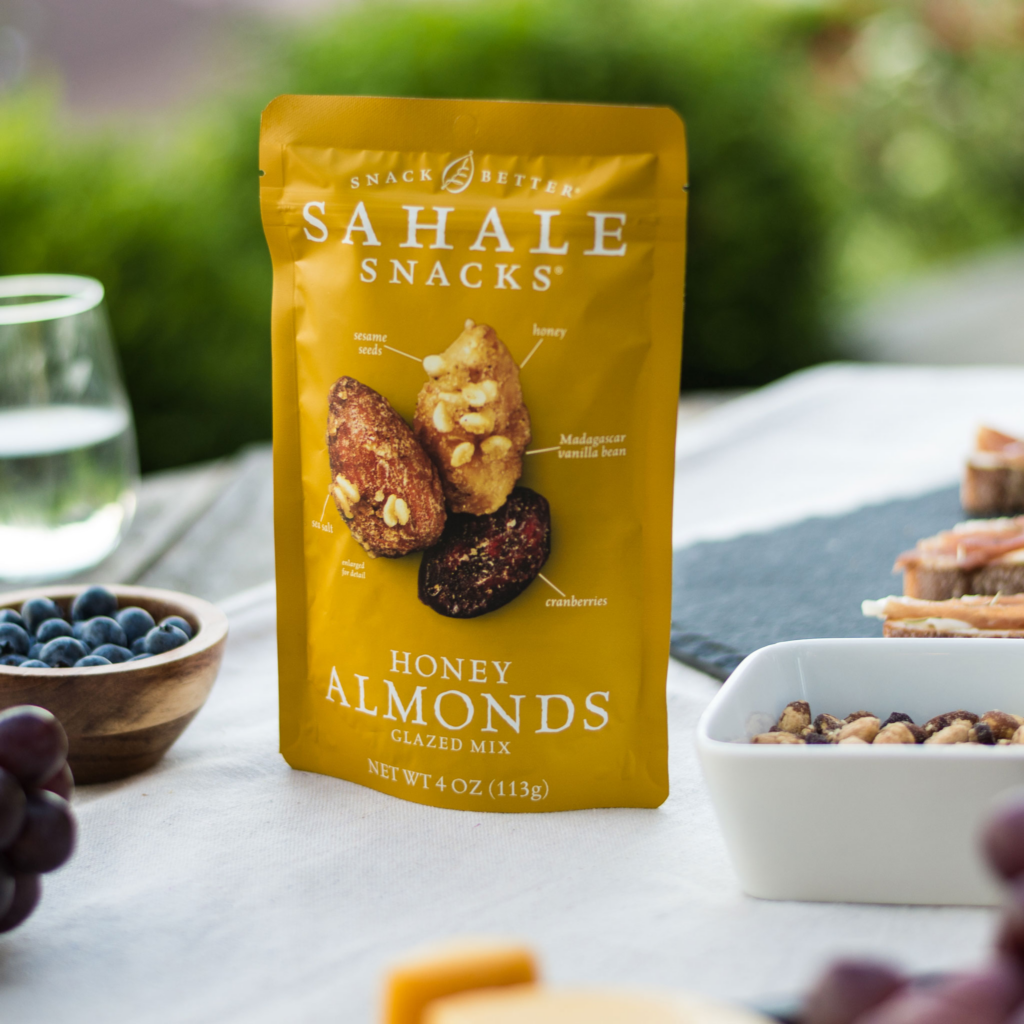
Nut Brands That are NOT Gluten-Free
Great Value (Walmart) makes privately labeled nuts; however, its packaging displays an allergen disclosure statement that says the nuts may contain wheat.
Favorite Day and Good and Gather nuts sold at Target contain an allergen disclosure statement that says it’s processed in a facility that contains wheat.
Beware of store brands of nuts from Kroger and Safeway-Albertsons. Read the ingredient statements carefully, as most privately-labeled brands display a “may contain wheat” statement.
A Word About The Nuttery
The Nuttery offers gourmet nuts, chocolates, and candies, and because it’s kosher, it’s very popular among the Jewish community. A spokesperson told me that NONE of their products are gluten-free.
How to Protect Yourself
If you’re in the market for a good nut, consider these safety tips:
(1) Buy nuts from reputable brands that are labeled gluten-free or, even better, certified gluten-free. Nuts.com is a great way to find certified gluten-free nuts at a great price, and the company will ship them to your doorstep. All Emerald nuts are certified gluten-free, too, so this is a brand you can feel good about supporting.
(2) Read labels carefully, as the ingredient statement will always have the best and latest allergen information for any product. Remember, ingredients and formulations can change at any time, as evidenced by the growing list of companies on my list of Formerly Gluten-Free Products that Now Contain Gluten
(3) Test with a Nima if you want extra assurance.
If a brand of nuts is missing from this article or there’s one you’d like me to test, please contact us to share.
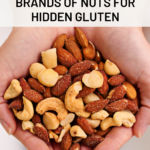
You are bringing up a limitation of all testing, which I talk about in the article and is of concern to many. Unfortunately there is no fool proof method.
I very much appreciate the testing and information you give so freely. I do have a question/concern: you seem to rely heavily on your Nima sensor. My concern is that you test one small part of one nut and label the bag GF. I would think that at the least you should grind up a whole bag and test a subsample. But also I’m sure it matters where in the production that particular bag was situated – was it the first bag off the line after hundreds of bags of flour? Or the 10,000th bag by which time the equipment was probably clean. Again, I do appreciate your articles, but this has always bothered me.
Thanks so much for your work on nuts. I recently got sick from some nuts from my local grocer. I will stick with the name brands you mentioned.
Thank you! Strangely, the Kirkland brand of whole almonds does not have any warning about shared equipment (I check every time to make sure they don’t change the label) so I buy them, but stay away from all their other nuts.